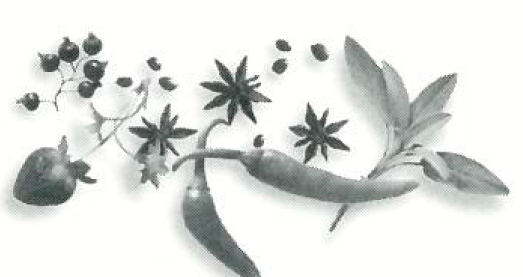
I am a steadfast refugee from the computer age, a modern dinosaur, born too late and disinclined to type, send e-mail, or surf the Net. I know that in the time it would take me to learn to use the computer I could bud and graft disappearing strains of heritage apples, a far more compelling task for my hands and mind.
Even though I am a techno-twit, hiding from the roar of the twenty-first century behind brocade skirts of black peppermint, cool mint lettuce, and burgundy amaranth, I know about Y2K computer panic with all of its triplicate zeroes and threats of disaster. I know about it and also brood over the potential danger of worldwide shutdown of nuclear power plants caused by millennial computer failure.
Closer to home, Y2K panic is expressed as fear of scarcity and of interrupted food and water service. Since most of the food we eat in the “developed world” travels at least 1,200 miles before reaching our tables, this breakdown fear is quite real. So I have a simple, timely, and non-computerized response to Y2K panic: Join with your friends and neighbors and grow a small garden this fall, and then draw your table closer to that garden.
There is ample precedent for this suggestion. During World War II, Victory Gardens were planted to help provide food during a time of rationed supplies. If there were a lack of arable land for starting these gardens, breaking up tarmac and pavement was widely sanctioned so that fresh food could be grown. Victory gardens not only bred good vegetables, they also spawned a vital sangha of intertwined gardeners, and strengthened the roots of urban, suburban, and rural life.
Planting a Y2K garden in these times is similar to practicing tonglen meditation. which works by breathing in hot disaster and exhaling cool, bright light. So take into your lungs the smoky fear of computer shutdown and a real lack of food and water. And breathe out confidence and generosity bolstered by gathering your wits about you and growing food for those who are hungry and afraid.
It’s quite simple, really. Winter gardens can be started throughout the continental United States in this season as long as you have a few months before your first heavy frost. Since it is a little late, consider transplanting hardy, open-pollinated seedlings to get a jump on the season. If you must start from seed, be sure to choose cold-resistant varieties that mature in under sixty days from seed.
Begin by planting robust winter vegetables like Swiss chard, red Russian kale, Nelson storage carrots, and deCicco sprouting broccoli, all great in stews, soups and stir-fries. For January salad greens, praise be to Osaka purple mustard, Minor’s lettuce, mache, and minutina, a crunchy salad green that regrows mightily after each cutting. For New Year flowers to welcome the turn of the millennium, plant Mourning Bride Scabious, clove-scented stock, and flame-colored calendulas that exude warmth and cheer.
Instead of protecting your garden, see how much of it you can share or give away. In the 6,000-year-old history of agriculture there has always been the lively tradition of growing for the hungry. In Leviticus there is the clear admonition not to cut the corners of your field but to leave the crop standing to be shared by the poor, the hungry, and the stranger.
So practice tonglen and dana paramita, the old perfection of giving, as you harvest your crops. On New Year’s Eve plan a potluck dinner gleaned from the unlocked Y2K gardens in your community. Eat together, practice sitting meditation until the wee hours of the morning, and garden wholeheartedly, without cutting any corners.
For good seed and horticultural information, contact:
Johnny’s Selected Seeds
Albion, Maine
www.johnnyseeds.com
(207) 437-3395
Bountiful Garden Seed Company
Willets, California
bountiful@zapcom.net
(707) 459-6410
Renee’s Garden
Felton, California
Renee@pacbell.net
Abundant Life Seed Foundation
Port Townsend, Washington
(360) 385-5660
Seeds of Change
(888) 762-7333
Thank you for subscribing to Tricycle! As a nonprofit, we depend on readers like you to keep Buddhist teachings and practices widely available.